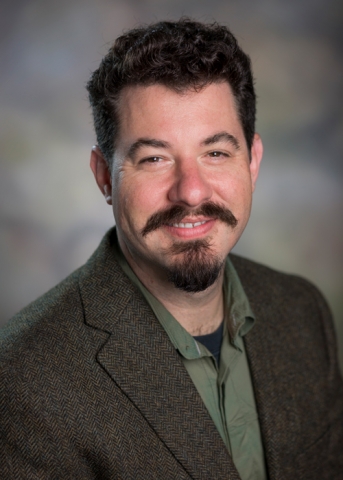Faculty Spotlight: 16 Questions with Brett C. Ginsburg, Ph.D.

 1) Please tell me about yourself.
1) Please tell me about yourself.
I am an associate professor of psychiatry and behavioral sciences at UT Health San Antonio. I earned my Ph.D. in pharmacology from Emory University in Atlanta, Georgia. My undergraduate degree is in chemistry from Southwestern University in Georgetown, Texas. I have a lovely family. My wife Heather also works in public service, for the San Antonio Water System. I have a teenage son, Zayne, and a preteen daughter, Zara, who keep me sharp on algebra and Texas history.
2) What brought you to UT Health San Antonio?
I came as a postdoctoral fellow and stayed when I had the opportunity to join the faculty. I was primarily attracted to UT Health San Antonio because of the world-class substance abuse researchers here. I grew up in San Marcos, so I have to say that Tex-Mex and barbecue brisket was also a factor in my coming back to central Texas.
3) Tell me about your research interests and why you are passionate about this topic?
Historically, my research has been focused on substance abuse and its treatment. I have always been interested in how drugs affect behavior, and why, for some people, drugs can come to exert so much control over their behavior that other aspects of their lives suffer. More recently, I have started research on chronic pain and its treatment by both opioids and physical activity. Like most Americans, I know people who suffer from chronic pain conditions, and I am aware of the inadequacy of long-term opioids use to control it. I believe this is an area that touches the lives of most Americans, and many others worldwide.
4) What do you want the public to know about your research? Why is your topic important?
Psychoactive substances are neither good nor bad. Like almost anything, it is how they are used that is relevant. Prohibiting all use of a substance, whether it is a recreational drug like alcohol or an analgesic like the opioids, results in harms every bit as damaging as overuse of those same drugs. Helping people make responsible choices and preventing (or reversing) the control addictive drugs exert on a person when use becomes a problem can improve the life of the person, as well as the lives of his or her family, friends, and neighbors.
5) What is your favorite part of your job?
I really enjoy working with colleagues to design experiments and solve problems. I also like scientific writing. It brings me the same sort of satisfaction one might get from solving a puzzle or crossword.
6) What is the most challenging part of your job?
Maintaining funding to support my position, my staff, and my research.
7) What do you like most about mentoring students?
I like watching them take a concept and incorporate concepts into their own novel ideas and experiments.
8) How do you like to spend your free time?
I spend time with my family. We particularly enjoy camping and hiking.
9) What is the most helpful advice you’ve received?
In this work, we fail more often than we succeed. Continuing on, even in the face of withering criticism or rejection, is the path to success.
10) When did you start becoming interested in science?
I have been interested in aspects of science for as long as I can remember.
11) Growing up, what did you want to be?
At times, a park ranger, a doctor, and a software developer. But mostly I always wanted to be a biologist or chemist.
12) If you were stranded on a deserted island, what one band or musician would help keep your sanity?
Jean-Michel Jarre.
13) What is your favorite quote?
How about two? (Both by Spinoza):
“Men who are ruled by reason desire nothing for themselves which they would not wish for all mankind.
And this one, more relevant to my specific research: “The terms good and bad indicate no positive quality in things regarded in themselves, but are merely modes of thinking or notions, which we form from the comparison of things one with another. Thus one and the same thing can be at the same time good, bad, and indifferent. For instance, music is good for him that is melancholy, bad for him that mourns; for him that is deaf; it is neither good nor bad”
14) If you could have dinner with one person, living or dead, who would it be?
As my favorite quotes suggest, I would choose Baruch Spinoza.
15) Which authors or books have influenced you the most?
Guide for the Perplexed – Mamonides
The Autobiography of Benjamin Franklin
Tactics of Scientific Research: Evaluating Experimental Data in Psychology – Sidman
16) Tell us something about yourself that otherwise we wouldn’t know or guess.
I am a (reasonably) skilled vintage diesel Mercedes-Benz mechanic.
